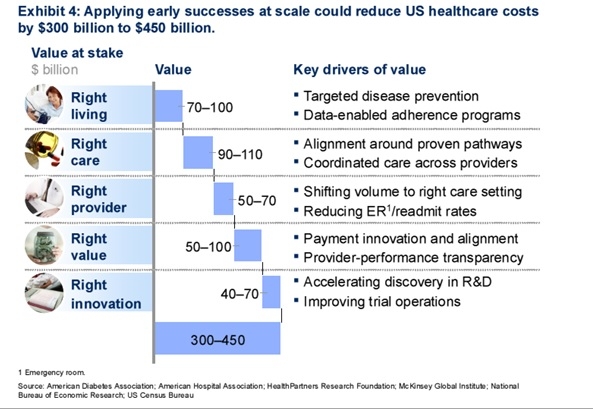 The big data could transform the healthcare sector accelerating value and innovation.
The big data could transform the healthcare sector accelerating value and innovation.
 The big data could transform the healthcare sector accelerating value and innovation.
The big data could transform the healthcare sector accelerating value and innovation.
The use of “big data” could reduce the US healthcare costs by $300 billion to $450 billion, but the industry must undergo fundamental changes before stakeholders can maximize on its full value according to new report from McKinsey & Company.
The report, The Big Data Revolution in Healthcare: Accelerating Value and Innovation written by Peter Groves, Basel Kayyali, Steve Van Kuiken, and David Knott discusses the analytic capabilities that will be required to capture big data’s full potential for payors, pharmaceutical companies, and providers.
To fully understand the impact of big data on the healthcare system, the report created a holistic, patient-centered framework that considers five key pathways to value, based on the concept that value is derived from the balance of healthcare costs and patient outcomes. The five new value pathways are:
1. Right Living
Patients can build value by taking an active role in their own treatment, including disease prevention. The right-living pathway focuses on encouraging patients to make lifestyle choices that help them remain healthy, such as proper diet and exercise, and take an active role in their own care if they become sick.
2. Right care
Pathway involves ensuring that patients get the most timely, appropriate treatment available. Right care requires a coordinated approach: across settings and providers, all caregivers should have the same information and work toward the same goal to avoid duplication of effort and suboptimal strategies.
3. Right Provider
This pathway proposes that patients should always be treated by high-performing professionals that are best matched to the task and will achieve the best outcome. Right provider has two meanings:
- Right match of provider skill set to the complexity of the assignment e.g. nurses or physicians’ assistants performing tasks that do not require a doctor
- Specific selection of the provider with the best proven outcomes
4. Right Value
To fulfill the goals of this pathway, providers and payors will continuously enhance healthcare value while preserving or improving its quality. This pathway could involve multiple measures for ensuring cost-effectiveness of care, such as tying provider reimbursement to patient outcomes, or eliminating fraud, waste, or abuse in the system
5. Right Innovation
This pathway involves the identification of new therapies and approaches to delivering care, across all aspects of the system, and improving the innovation engine themselves. To capture this value, stakeholders must make better use of prior trial data- such as by looking for high potential targets and molecules in pharma. The data can used to find opportunities to improve clinical trials and traditional treatment protocols, including those for births and inpatient surgeries.
It is estimated that the pathways could account for $300 billion to $450 billion in reduced healthcare spend, or 12 to percent of the $2.6 trillion baseline in US healthcare costs, as shown in the graph below.
 Source: McKinsey & Company
Source: McKinsey & CompanyExamples of innovative healthcare leaders that have already captured value from the new value pathways include:
- Kaiser Permanente has fully implemented a new computer system, HealthConnect, to ensure data exchange across all medical facilities and promote the use of electronic health records. The integrated system has improved outcomes in cardiovascular disease and achieved an estimated $1 billion in savings from reduced office visits and lab tests.
- Blue Shield of California, in partnership with NantHealth, is improving health-care delivery and patient outcomes by developing an integrated technology system that will allow doctors, hospitals, and health plans to deliver evidence-based care that is more coordinated and personalized. This will help improve performance in a number of areas, including prevention and care coordination.
- AstraZeneca established a four-year partnership with WellPoint’s data and analytics subsidiary, HealthCore, to conduct real-world studies to determine the most effective and economical treatments for some chronic illnesses and common diseases. AstraZeneca will use HealthCore data, together with its own clinical-trial data, to guide R&D investment decisions. The company is also in talks with payors about providing coverage for drugs already on the market, again using HealthCore data as evidence.
Other key report findings include:
- Primary pools of data at the heart of the big data revolution in healthcare
- Big data as a source of innovation in healthcare
- Key trends related to users, applications, and data sources
- How to sustain the momentum
- Recommended priorities for payors, providers, and manufacturers
- Guiding principles for advancing the big data agenda
For more information, visit McKinsey & Company to view the full report.
The post 5 New Value Pathways Fueling the Big Data Revolution in Healthcare appeared first on Electronic referral software for primary care and specialists.






